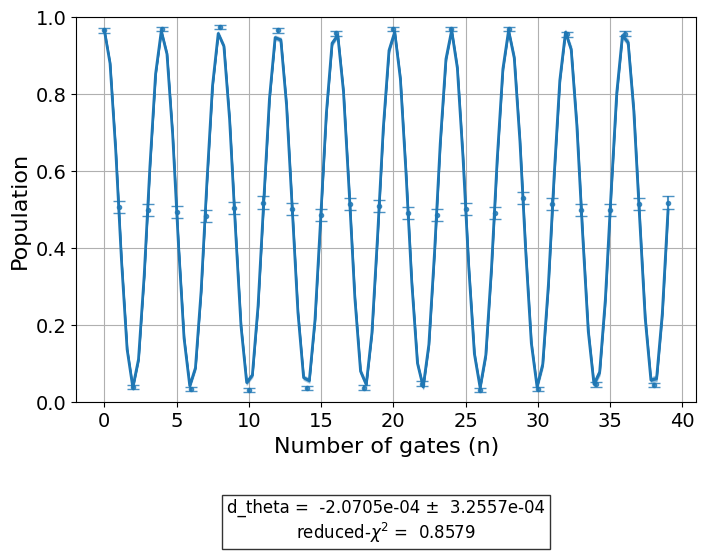Note
This is the documentation for the current state of the development branch of Qiskit Experiments. The documentation or APIs here can change prior to being released.
FineFrequency¶
- class FineFrequency(physical_qubits, delay_duration, backend=None, repetitions=None)[source]¶
An experiment to make a fine measurement of the qubit frequency.
Overview
The fine frequency characterization experiment measures the qubit frequency by moving to the equator of the Bloch sphere with a sx gate and idling for a time \(n\cdot \tau\) where \(\tau\) is the duration of the single-qubit gate and \(n\) is an integer which ranges from zero to a maximal value in integer steps. The idle time is followed by a rz rotation with an angle \(n\pi/2\) and a final sx gate. If the frequency of the pulses match the frequency of the qubit then the sequence \(n\in[0,1,2,3,4,...]\) will result in the sequence of measured qubit populations \([1, 0.5, 0, 0.5, 1, ...]\) due to the rz rotation. If the frequency of the pulses do not match the qubit frequency then the qubit will precess in the drive frame during the idle time and phase errors will build-up. By fitting the measured points we can extract the error in the qubit frequency. The circuit that are run are
┌────┐┌────────────────┐┌──────────┐┌────┐ ░ ┌─┐ q: ┤ √X ├┤ Delay(n*τ[dt]) ├┤ Rz(nπ/2) ├┤ √X ├─░─┤M├ └────┘└────────────────┘└──────────┘└────┘ ░ └╥┘ meas: 1/══════════════════════════════════════════════╩═ 0Analysis class reference
Experiment options
These options can be set by the
set_experiment_options()method.- Options
Defined in the class
FineFrequency:repetitions (List[int])
Default value: [0,1,2,3,4, …]A list of the number of times that the delay is repeated.delay_duration (int)
Default value:NoneThe duration of the delay as the number ofdts it contains. The total length of the delay in units ofdtwill be n timesdelay_durationwhere n also determines the rotation angle of theRZGateby \(n \pi/2\).
Defined in the class
BaseExperiment:max_circuits (Optional[int])
Default value:NoneThe maximum number of circuits per job when running an experiment on a backend.
Example
from qiskit_experiments.library.characterization import FineFrequency exp = FineFrequency([0], delay_duration=int(30e-9 / backend.dt), backend=backend) exp_data = exp.run().block_for_results() display(exp_data.figure(0)) exp_data.analysis_results(dataframe=True)

name experiment components value quality backend run_time chisq 6672abf3 d_theta FineFrequency [Q0] 0.01873+/-0.00022 good T2Hahn_simulator None 0.781719 Initialization
Setup a fine frequency experiment on the given qubit.
- Parameters:
physical_qubits (Sequence[int]) – List containing the qubit on which to run the fine frequency characterization experiment.
delay_duration (int) – The duration of the delay at \(n=1\) in dt.
backend (Backend | None) – Optional, the backend to run the experiment on.
repetitions (list[int] | None) – The number of repetitions, if not given then the default value from the experiment default options will be used.
Attributes
- analysis¶
Return the analysis instance for the experiment
- backend¶
Return the backend for the experiment
- experiment_options¶
Return the options for the experiment.
- experiment_type¶
Return experiment type.
- num_qubits¶
Return the number of qubits for the experiment.
- physical_qubits¶
Return the device qubits for the experiment.
Methods
- circuits()[source]¶
Return the list of quantum circuits to run.
- Return type:
list[QuantumCircuit]
- config()¶
Return the config dataclass for this experiment
- Return type:
- copy()¶
Return a copy of the experiment
- Return type:
- classmethod from_config(config)¶
Initialize an experiment from experiment config
- Return type:
- job_info(backend=None)¶
Get information about job distribution for the experiment on a specific backend.
- Parameters:
backend (Backend) – Optional, the backend for which to get job distribution information. If not specified, the experiment must already have a set backend.
- Returns:
A dictionary containing information about job distribution.
”Total number of circuits in the experiment”: Total number of circuits in the experiment.
”Maximum number of circuits per job”: Maximum number of circuits in one job based on backend and experiment settings.
”Total number of jobs”: Number of jobs needed to run this experiment on the currently set backend.
- Return type:
dict
- Raises:
QiskitError – if backend is not specified.
- run(backend=None, sampler=None, analysis='default', timeout=None, backend_run=None, **run_options)¶
Run an experiment and perform analysis.
- Parameters:
backend (Backend | None) – Optional, the backend to run on. Will override existing backend settings.
sampler (BaseSamplerV2 | None) – Optional, the sampler to run the experiment on. If None then a sampler will be invoked from previously set backend
analysis (BaseAnalysis | None) – Optional, a custom analysis instance to use for performing analysis. If None analysis will not be run. If
"default"the experimentsanalysis()instance will be used if it contains one.timeout (float | None) – Time to wait for experiment jobs to finish running before cancelling.
backend_run (bool | None) – Use backend run (temp option for testing)
run_options – backend runtime options used for circuit execution.
- Returns:
The experiment data object.
- Raises:
QiskitError – If experiment is run with an incompatible existing ExperimentData container.
- Return type:
- set_experiment_options(**fields)¶
Set the experiment options.
- Parameters:
fields – The fields to update the options
- Raises:
AttributeError – If the field passed in is not a supported options
- set_run_options(**fields)¶
Set options values for the experiment
run()method.- Parameters:
fields – The fields to update the options
See also
The Setting options for your experiment guide for code example.
- set_transpile_options(**fields)¶
Set the transpiler options for
run()method.- Parameters:
fields – The fields to update the options
- Raises:
QiskitError – If initial_layout is one of the fields.
See also
The Setting options for your experiment guide for code example.